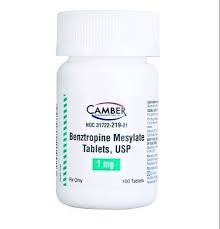A nurse is preparing to administer benztropine 2 mg IM every 12 hr to a client who is experiencing an extrapyramidal reaction. Available is benztropine 1 mg/mL for injection. How many ml should the nurse administer per dose? (Round the answer to the nearest whole number. Use a leading zero if it applies. Do not use a trailing zero.)
The Correct Answer is ["2"]
The nurse is preparing to administer benztropine 2 mg IM every 12 hours. The concentration of the available benztropine is 1 mg/mL.
To calculate the volume (mL) of the medication needed for the prescribed dose, you can use the formula:
Volume (mL) = Dose (mg) / Concentration (mg/mL)
Plugging in the values:
Volume (mL) = 2 mg / 1 mg/mL = 2 mL
So, the nurse should administer 2 mL of benztropine 1 mg/mL for each dose. Since we're looking for a whole number, we round to the nearest whole number, which is 2 mL.

Nursing Test Bank
Naxlex Comprehensive Predictor Exams
Related Questions
Correct Answer is D
Explanation
A. "Tell me who you think doesn't care about you."
Explanation: This response might come across as confrontational or defensive, which could discourage the client from opening up further. It's important to offer support and understanding rather than putting the client on the spot.
B. "Of course people care. Your family comes to visit every day."
Explanation: While it's true that the client's family visits, depression often distorts perception and emotions. Telling the client that people care might not be fully effective in addressing their feelings of worthlessness.
C. "Why do you feel that way?"
Explanation: This response opens the door for the client to express their emotions and thoughts. It encourages further conversation and helps the nurse understand the underlying causes of the client's feelings.
D. "I care about you, and I am concerned that you feel so sad."
Explanation: Correct Answer. This response shows empathy and genuine concern for the client's well-being. It acknowledges the client's emotions, offers support, and validates their feelings.
Correct Answer is C
Explanation
A. The client is unwilling to accept that treatment is needed.
This alone may not be sufficient to keep the client under a 72-hour hold. While a person's refusal to accept treatment may indicate a need for care, it might not meet the criteria for involuntary commitment unless there is an immediate danger to the individual or others.
B. The client states that she does not like the neighbor.
Disliking a neighbor is not typically a sufficient reason to place someone under a 72-hour psychiatric hold. The criteria for involuntary commitment usually revolve around a person's potential to harm themselves or others due to their mental state.
C. The client is a danger to herself or others.
Explanation:
In many jurisdictions, a 72-hour psychiatric hold, also known as an involuntary psychiatric hold or emergency detention, allows mental health professionals to detain a person who is considered a danger to themselves or others due to their mental condition. This is done to ensure the safety of the individual and those around them. The hold provides a brief period during which a psychiatric assessment can be conducted to determine the appropriate course of action for the person's mental health treatment.
D. The client states that she plans to move out of the state immediately.
While this statement might raise concerns about the client's stability, it generally would not meet the criteria for a 72-hour hold unless there is clear evidence that the client's immediate move would pose a risk to their own safety or the safety of others. The hold is more focused on imminent danger rather than potential future actions.
Whether you are a student looking to ace your exams or a practicing nurse seeking to enhance your expertise , our nursing education contents will empower you with the confidence and competence to make a difference in the lives of patients and become a respected leader in the healthcare field.
Visit Naxlex, invest in your future and unlock endless possibilities with our unparalleled nursing education contents today
Report Wrong Answer on the Current Question
Do you disagree with the answer? If yes, what is your expected answer? Explain.
Kindly be descriptive with the issue you are facing.
